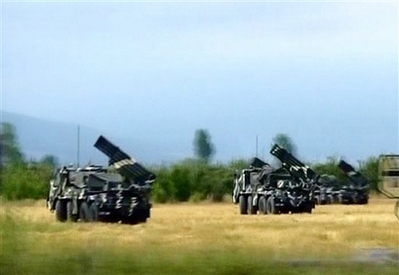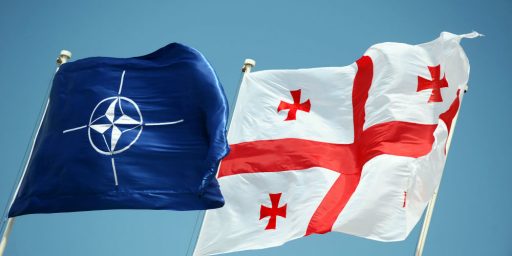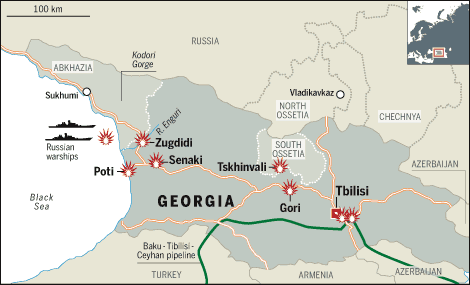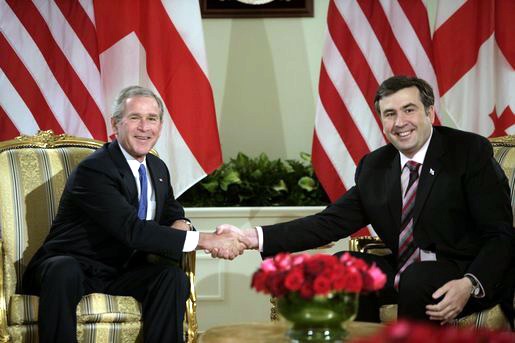Georgia Crisis: Who Started It?
Michael Totten has a detailed post on the ongoing crisis in Georgia pushing back against the conventional wisdom:
Virtually everyone believes Georgian President Mikheil Saakashvili foolishly provoked a Russian invasion on August 7, 2008, when he sent troops into the breakaway district of South Ossetia. “The warfare began Aug. 7 when Georgia launched a barrage targeting South Ossetia,” the Associated Press reported over the weekend in typical fashion.
Virtually everyone is wrong. Georgia didn’t start it on August 7, nor on any other date. The South Ossetian militia started it on August 6 when its fighters fired on Georgian peacekeepers and Georgian villages with weapons banned by the agreement hammered out between the two sides in 1994. At the same time, the Russian military sent its invasion force bearing down on Georgia from the north side of the Caucasus Mountains on the Russian side of the border through the Roki tunnel and into Georgia. This happened before Saakashvili sent additional troops to South Ossetia and allegedly started the war.
I agree with this analysis insofar as it goes. I’d quickly add, however, a major caveat: Any search for blame in this matter that starts in the summer of 2008 — or, indeed, this century — is bound to fail. There’s been plenty of action and reaction going on for generations to pin the responsibility on any one person or event.
The signage pictured above, taken from Totten’s post, captures that fact rather nicely. It’s also, shrewdly, in English and therefore aimed at an external audience.
UPDATE: Joshua Foust has a detailed rebuttal to Totten’s post and, in particular, his reliance for much of the part of that post I didn’t excerpt on a paid advocate for the Saakasvili government. More generally, though, he amplifies the subtext of my brief commentary above: Most observers of this conflict simply have too little knowledge of the backstory to provide insightful commentary.






Urban Meyer
I thought Mr. Totten was quite clear about the underlying origins of this crisis originating in policies the Kremlin has been advocating and directing since the early 1990’s. And, of course, the historical enmity goes back into the dim mists of ancient history.
It seems a little misleading to quote the first paragraphs of the long article that speak of the fuse for the current crisis being ignited the day before conventional wisdom has dictated and then saying this anaylsis is good as far as it goes. Mr. Totten’s article goes into much, much greater depth than that.
But Charles, on the “who lit the fuse question,” Totten writes:
Then, there’s this:
I think on balance, Totten’s article is supportive of James’s caveat:
I reject and resent the implication, from Foust (sure that’s not “Faust”?) or anyone else, that only “experts” can draw meaningful opinions about this conflict. Yes, it has a complicated and long history. So does everything else.
We can debate for hours and days and months and years and decades about the justifications for the southern states’ succession from the Union, but one need not undertake that full exercise to conclude, correctly, that slavery was evil and the South was wrong to try to preserve it.
Wishy-washy relativism — John Kerry “global test” relativism, Barack Obama “citizen of the world” relativism — is the exact camouflage the Russian Bear craves. What Russia is doing is evil and wicked and brutal, and it threatens not only innocents abroad, but American interests.
Reagan understood this. I think McCain, for all his many other flaws, does too.
How does it threaten our interests?
When McCain was in High School?
How does it threaten our interests?
Um Georgia has a pretty good oil reserve and pipeline. Georgia is a much friendlier friend than a lot of the other countries with oil. It is in our interest to keep them friendly.
Also, Russian Imperialism threatens peace in Europe. I think you could make the argument that a peaceful Europe is in the best interests of the US, and depending on where Russia might want to carry its Imperialism in the future, it could drag us into a conflict that involves NATO for real.
Blame assignment in this conflict is probably in the end a futile task.
Lotsa “could” in there. Do you have any specifics re Europe proper? If not, this isn’t any advance on Beldar’s bald assertion.
To many rambling posts with incessant references to “The Bear” could rob us of the will to live…
A recurring theme of Foust’s is that nobody knows as much as him, which is why I quit reading his blog. Totten’s there, doing reporting, while Foust is dissing him, as he disses practically everyone else who’s not Joshua Foust. Get on a plane, Josh, or shut up.